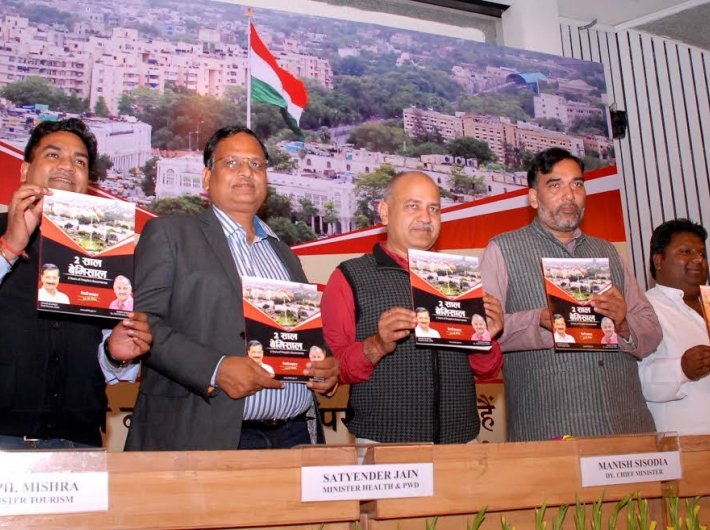The AAP had promised to turn-around the civic amenities in Delhi when it came to power in 2015. In the past two years, it doesn’t seem to have covered much ground.
The Aam Aadmi Party (AAP) led government in Delhi has completed two years in office. The government repeatedly accused the central government of creating obstacles and stalling projects, yet they claim to have achieved a lot in a short span of time. From a bitter tug of war with former LG Najeeb Jung to lawmakers mired in controversies, the past two years were marked by lots of ups and downs.
But have they delivered their big-ticket promises in these two years? Governance Now finds out.
Health
Over last one year, 108 mohalla clinics have treated almost 5 lakh patients. The government had planned to set up 1,000 mohalla clinics, provide medicines and carry out of tests free of cost by the end of 2016. This deadline has been extended to March 2017. Global leaders like former UN secretary general Kofi Annan and former WHO director general Dr Gro Harlem Brundtland acclaimed the project for aiming to provide free public health care and indicated the need to improve its management.
Almost Rs 100 crore was allocated for the pilot-project, but only Rs 26 crore have been spent so far, according to sources. While the AAP government has claimed it as their path breaking achievement and received international acclaim, insiders believe that the project is still at a budding stage.
Free medicines?
Delhi government has provided a long list of essential drugs —tablets, injections, syrups and drops free of cost at all government dispensaries, clinics and hospitals. This includes almost 1,390 medicines, nearly four times the National List of Essential Medicines which has 376 medicines. The ground reality, however, is different. Almost all the medicines are available at the government chemist shops. But, patients have to queue up for several hours to get even basic medicines.
Education
The government claims to have built 8,000 new classrooms (infrastructure equal to approximately 200 schools) and 21 new school buildings. Unable to find land to build 500 “new” schools it promised two years ago, the Delhi government said they constructed “new” classrooms in existing schools to increase enrolment of students. Deputy chief minister Manish Sisodia said the idea was that more students would have access to quality education.
Tagging it as their biggest achievement, Sisodia said that they prevented arbitrary fee hike in private schools by auditing accounts of all schools on government allotted land. For the first time, numerous private schools had to roll back their fees and give a refund to parents.
The government is struggling to hire new teachers. Sisodia pointed out that a proposal to make nearly 17,000 guest teachers permanent is yet to get LG’s approval. While the Delhi Subordinate Services Selection Board (DSSSB) conducted exams to fill 5,000 teaching posts out of which 2,500 joined various schools, the remaining vacancies are yet to be fulfilled, said an official.
Transport
Sisodia admits that they have not been able to sort out the matter of new buses. “The concerned minister has been struggling with the files for the past seven-eight months. He has been writing to officers who are using excuses like the need for a 'scientific' study for this project. A study has been done but who is to say whether it is 'scientific' or not,” he said.
“The rising number of vehicles is a huge deterrent. Each day there are lakhs of vehicles running on Delhi that produce poisonous gases. Apart from thermal plants and pollution from industries, vehicular pollution is the biggest threat,” says PK Sarkar, professor of transport planning at Delhi’s School of Planning and Architecture. “If the government does not work to improve public transport, the number of vehicles is going to rise into millions in the coming years. There should be congestion pricing or a vehicle quota system.”
Environment and Pollution
Due to higher levels of pollution and congestion due to traffic, Delhi government introduced the Odd-Even Scheme in Delhi twice i.e. January 1-15, 2016 and April 15-30, 2016. The AAP government also launched its first 'Car-Free Day' on October 22,2015 with chief minister Arvind Kejriwal leading a cycle rally.
“The city needs to scale up its public transport and clean up the congestion around metro stations, improving last-mile connectivity between stations and residential neighbourhoods,” says Anumita Roy Chowdhary, executive director (research and advocacy) and head of the air pollution and clean transportation cell of Centre for Science and Environment. “Imposing a congestion tax and making parking more expensive should help dampen the city’s car addiction. Slashing diesel subsidies or imposing higher taxes on diesel vehicles could help. The government should take emergency action to reduce emissions on high-pollution days.”
Water
The government claimed that 256,883 domestic unique water connections with functional meters have availed the benefit of free water supply upto 20,000 litres per month. According to the AAP, the total number of active consumers which were around 19.20 lakh as on April 1, 2015 has increased to 21.66 lakh and efforts are being made to ensure bi-monthly billing of all these consumers in the last two years.
However, water continues to be the biggest headache for many. Sachin Ravindran, a resident of Khanpur has claimed that they still have to buy water from water tankers. “Nothing has changed. The entire colony faces this problem. We still buy water from these illegal water tankers,” he said. Currently, about 83% households of Delhi have access to piped water supply. In the past two years, over 1,200 unauthorized colonies had got access to the water supply network.
Electricity
One of the popular promises during AAP’s election campaign trail was 50% subsidy on power tariffs for those who consume up to 400 units. After two years of power, the government claims no electricity tarrif hike.
“The subsidy of 50 percent on electricty charges for all domestic consumers consuming upto 400 units per month is being provided since March 2015,” said minister Satyendar Jain.
But occupants of rented houses are particularly upset. According to Census 2011, at least 30% of all families in Delhi live in rented accommodations and this section claims the benefits are yet to reach them.

